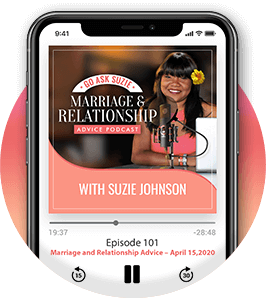![]() My husband had an affair with one of his employees. Now, he’s pressuring me to forgive him and to not break up our family — as if it was me that would break our family. At first, I did tell him I forgive him, but now a little voice in the back of my head keeps saying that my desire to please people pushed me to forgive. While I do see that he didn’t realize the consequences his actions would have caused when he had his affair, and while I feel like I can forgive him for not having this knowledge, I am still furious that he did it, and I am mad at him for pressuring me to forgive. I think his intentions were solely self-serving, both in having the affair and now pressuring me to forgive. Can you help me get past it?
My husband had an affair with one of his employees. Now, he’s pressuring me to forgive him and to not break up our family — as if it was me that would break our family. At first, I did tell him I forgive him, but now a little voice in the back of my head keeps saying that my desire to please people pushed me to forgive. While I do see that he didn’t realize the consequences his actions would have caused when he had his affair, and while I feel like I can forgive him for not having this knowledge, I am still furious that he did it, and I am mad at him for pressuring me to forgive. I think his intentions were solely self-serving, both in having the affair and now pressuring me to forgive. Can you help me get past it?
![]() Thank you for the opportunity to serve. I saw a bumper sticker the other day, and it said “Don’t believe everything you think.” With that in mind, I’d like to begin by asking you a question: That voice in the back of your head that’s telling you it’s your desire to please that made you forgive… whose voice is it?
Thank you for the opportunity to serve. I saw a bumper sticker the other day, and it said “Don’t believe everything you think.” With that in mind, I’d like to begin by asking you a question: That voice in the back of your head that’s telling you it’s your desire to please that made you forgive… whose voice is it?
Think about this with me…
If in the past when you felt pressured, pushed and forced to do things you really didn’t want to do — for example, picking up the slack when it wasn’t your place, taking on responsibilities that you didn’t want — was it that same voice that made you do it?
The question is, where is the voice coming from? And why does it seem to have such power over you, as to make you do things you don’t actually want to do? And since this voice is coming from within, who’s the one talking, and who’s the one listening? I find this curious, don’t you?
Now would be a good time to remember that bumper sticker advice: Don’t believe everything you think.
Instead, I suggest you pay closer attention to the little voices that say you’re being pressured/being pushed and forced to do something you don’t want to do. Look closely at what the voices are telling you, and be willing to question them. Ask yourself: Is it true? Are you only forgiving to gain your husband’s approval? To please him? There are only two possible answers: Yes or No. Let’s tackle both scenarios.
Let’s say the only reason you “forgave” is to gain his approval (please him).
Let’s talk about that. Let’s deal with your need for approval because in this case, it would be the real pressure here (not forgiveness). Think about it like this: Imagine that your “need for approval” is like a drug. Then, this situation (his extra-marital affair) would be the excuse you use to give yourself permission to seek out the drug.
Could this be true? Well, ask yourself… hasn’t the need for approval been around a lot longer than this situation? Of course it has. And I can almost guarantee this isn’t the first time you felt pressured by your own need to gain approval. This is why the drug metaphor about “approval” works so well.
Here’s something to note:
Forgiveness isn’t about compliance, obedience or gaining approval. To forgive because you hope it will gain approval is a spectacular waste of time. And here’s why: Forgiveness (like love, trust or faith) can’t be forced upon you. No one can make you forgive (not even yourself). Forgiveness isn’t a loan that’s given in anticipation of a return on investment — it’s more like a gift that’s freely given. It has no conditions, no strings and no hidden agendas. So, can a person ever really forgive to gain approval? No, they can’t. The most they can do is “fake forgiveness.” So let that silence any voice that tells you, you can forgive to gain approval.
Now, let’s look at the other possibility.
Let’s say the answer is NO — you don’t “forgive” to gain approval.
This, in my opinion, is the more interesting scenario. Because if you don’t forgive to gain approval, then why would you forgive? Like you said in your question, you felt “pressured”, as if your husband were forcing you to forgive and it appears you simply don’t want to. So, if you’re not willing to forgive to gain approval, then the next logical question is, what would you be willing to forgive for? This (in my opinion) is perhaps the most important question betrayed partners could ask themselves.
What would allow you to abandon your anger and forgive?
In your case, so far, we’ve ruled out “pressure” (you’ve been pressured and you’re still angry).
- We’ve ruled out gaining approval.
- We’ve ruled out “keeping the family together”.
So far, none of these things have allowed you to abandon your anger. As you said in your question, you’re furious about this. So if none of these things will allow you to abandon your anger… then what would?
While you ponder that question, consider this:
What if I were to tell you that forgiveness is for you? That it’s not something you do for other people? How could I be so sure? Because forgiveness ends the suffering, the pain, and the hate that’s tearing you apart. It’s your mind that gets healed. It’s your spirit that’s restored to a state of grace. It’s you that it sets free.
And with this understanding…
…the question to ask is, why would anyone put off their own healing? Why would anyone deny or delay their own well-being? There’s only one reason I can think of: The only way someone would put off their own healing is IF they believe they’re gaining something bigger from keeping the pain.
And if this theory holds true (and it usually does), then the question is:
What do you gain by withholding forgiveness? What are the benefits of “unforgiveness”?
Well, we know you get to keep your anger. We know you get to stay furious. And perhaps most importantly, you get to keep punishing him, because as you said, you believe his intentions were selfish.
Listen up.
If anger, rage and punishment are where it’s at for you, then I suggest you honor that. If those are the things you want, then be honest about it.
There’s no doubt you’re hurt, and hurt people have a propensity to hurtpeople (especially the ones who’ve hurt them). But I must caution you about this approach. Here’s why: When it comes to hurting others (even if it’s retaliation), you can’t — and don’t — avoid hurting yourself.
Why?
- Because all actions have consequences, and those consequences are returned to the doer. Provoked or not, you pay the price of your every action — including revenge, retaliation or punishment.
- No thought leaves the mind of the thinker. Whatever you wish another human being, you also experience yourself. And perhaps most importantly…
- You never punish… without witnesses.
Think about it this way:
In your attempts to punish your husband, who are the witnesses? Well, youfor one. But what about the children? You guessed it. They have a front row seat to every harsh word, bitter comment, hostile stare, silent treatments, and muffled arguments behind closed doors — because no matter how couples try to hide it, children pick up on the energy in the home. So keep that in mind.
Let’s look at it another way:
Imagine that I’ve put an iron poker in a red-hot fireplace and allowed it to get really hot. Now, I ask you to go over to the fireplace and pick up that red-hot poker with your bare hands (and let’s imagine you trusted me enough to do it). As you pick up that poker and pain is searing your palms… what’s the firstthing you want to do?
Drop it! Right? And why do you want to drop it? Because it’s hurting you, that’s why! It doesn’t take a committee, a therapist or guru to tell you that if it’s painful, you need to drop it as fast as you can — not hold on to it.
And think about this… How ridiculous would it be if, while that poker was searing your hands, I were to fetch you a cold compress for your brow, give you some medication to dull the pain, waste time debating whether or not you should or shouldn’t drop it instead of urging you to let it go… I just wouldn’t be doing you any favors now, would I?
It’s the same with emotional pain. I’m urging you to drop it (forgive) and forgive fast. Not as a way to apply pressure, but as a way to relieve pain. Your pain.
Here’s the beautiful truth about forgiveness: It’s for you — NOT for him.
Your “unforgiveness” doesn’t punish him. It’s a way of punishing yourself first, and everyone else second. The charity and benefit of forgiveness is for YOU. It’s the aspirin for your headache, the remedy for your suffering. You do it, and you feel the relief.
Another thing is this:
Forgiveness — like trust, faith, and integrity — is a decision. They’re not “mystical experiences” — they’re decisions. And like any decision, you can make and unmake them on a daily/minute/second-by-second basis, if you wanted to.
The thing to note is that the decision to forgive must be practiced. Opting in and then opting out of that decision will only create instability, irritability and vivacious mood swings.
This, of course, is another definition of drama: Make one decision — and unmake that same decision a few minutes later. When you decide to forgive, you must also decide to “overlook” the opportunities that come to unmake that one decision. In other words… forgiveness requires a commitment — YOURS.
That’s why forgiveness is an act of personal integrity. It rests on your willingness to remain steadfast on your decision, and to “overlook” all the opportunities that come to unmake it.
I believe Hindi said it best when he said: “Forgiveness is not an attribute of the weak — it is an attribute of the strong.” And I agree, because there are plenty of temptations to “dig up” the hatchet once you’ve decided to bury it.
The good news is, those temptations get weaker and weaker every time you “overlook” them. For more help in resisting the temptation to dig up the past, read my article: What to Do When You Want to Forgive But Can’t.
Until we speak again…
Remember… Love Wins!

































